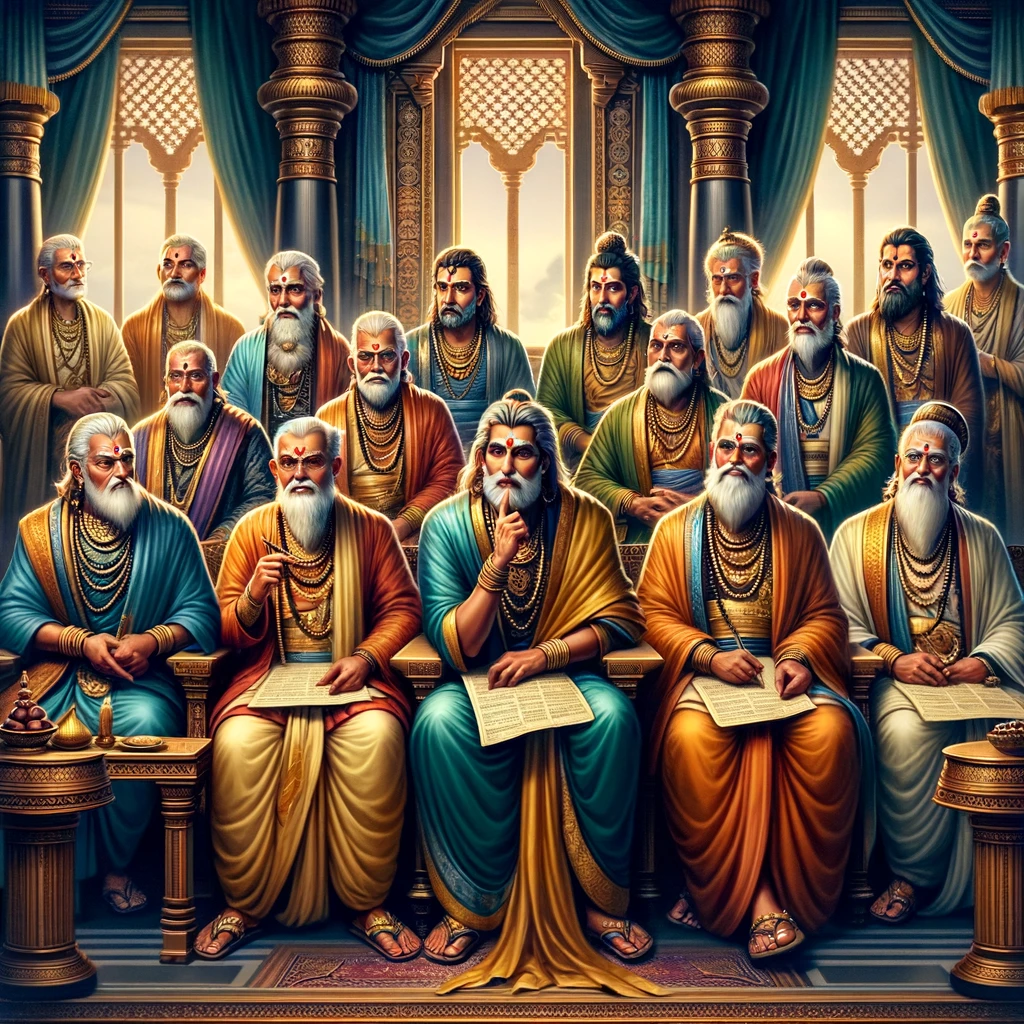Summary
The truthful and upright characters of the ministers of Dasharatha are portrayed, who make the ruler-ship meaningful with their virtuous, skilful and efficient administration. Along with the political ministers, the religious ministry is also portrayed [depicted].
Chapter [Sarga] 7 in Detail
The ministers for the great soul from Ikshvaku kings of Emperor Dasharatha, are epitomized [ideal example of] ones of their tactfulness, adroitness [clever] and are always obliged to undertake welfare activities of their king and the kingdom. [1-7-1]
Eight ministers are there for that valiant and glorious King Dasharatha, who are clean at heart and are involved in the works of the king and kingdom at all time. [1-7-2]
Dhristi, Jayantha, Vijaya, Suraashtra, Raashtravardhana, Akopa, Dharmapaala, are seven, and Sumantra is the eighth one. [1-7-3]
Two venerable [deserving to be regarded or treat with reverence] saints of eminence [a position of prominence or superiority] are religious ministers for they are authorities in Vedic rituals, namely Vasishta and Vamadeva, who are the acquiescent [acceptable] with religious matters, and apart from these two some more religious ministers are also there to King Dasharatha. [1-7-4]
Suyajna, Jabali, Kashyapa, Gautama, Maarkandeya, Deerghaayu, and then Kaatyayana are the scholarly Brahmans acting as religious ministers, and along with them there are also Brahma-sages who are always the ancestral [retaliating to ancestor] ritual scholars for Dasharatha’s family. [1-7-5, 6a]
All the ministers are well versed in scriptures; they shun [avoid] bad deeds, skilful ones in their duties with their senses regulated. Those great souls are affluent [rich], knower of all sciences, firmly courageous, and they are distinguished and quiet-souls, and those ministers are true to their word. They are magnificent, patient and famed ones and they smile afore [before] they converse. [1-7-6b, 8a]
They never speak untruthful words in anger or in greed or for monetary reasons either. There is nothing unknown to them, even a little, in their own country or in the others either, or about everything that is happening or has happened, or that is going to happen, for they know them through agents. [1-7-8b, 9]
They are efficient in administration and their friendships are well examined by the king, and those ministers impose punishment even on their own sons, if situation demands it. [1-7-10]
In collections to their treasury and to militarize their armies they are dutiful, even an unfriendly person will not be tortured, if he were not really blameworthy. [1-7-11]
They are valiant ones with engineered enthusiasm, administrators of political science, clean persons and protectors of subjects of their kingdom at all times. [1-7-12]
They do not persecute [to harass] Brahman-s and Kshatriya-s to fill-up the treasury, and high degree punishments will be given on assessing that person's, or the offender's strength and weakness. [1-7-13]
All of those ministers are clean administrators of kingdom, and are in league [an association of persons] with each other; as such there is none anywhere, either in capital or in country, a liar. [1-7-14]
None with an evil-mind or with an interest in other man's wife is there, and thus on whole in the kingdom and also like that in the capital, there is an undisturbed society. [1-7-15]
Well-dressed and well-decorated and they the ministers of King Dasharatha, observe decency in the interest of the king and also of the kingdom, with diligence [diligence] and with a truthful-eye. [1-7-16]
They acquired good qualities from their mentors and they are renowned by their expertise, and even in foreign countries they are famous for their intellectual determinations in all affairs. [1-7-17]
Versatile and virtuous are they the ministers and there is none who discarded his virtuosity [great technical skill], and they are the determiners of truce or war, and by their nature they possess opulence [wealth]. [1-7-18]
They are capable to keep up the confidentialities of strategies, and also capable to apply their mind even in micro-affairs, and they know moral science comprehensively, and above all, they are gentle articulators [put into words]. [1-7-19]
Accompanied with such of those effectual and good-natured ministers the exalted king Dasharatha ruled the earth. [1-7-20]
He that most generous one among men, Dasharatha, while observing through spies, and to protect people righteously, and to give a good governance to them, he forsook unrighteousness and became a generous king avowed to truthfulness alone, and thus he that Dasharatha ruled the earth, which ruler-ship is renowned in all the three worlds. [1-7-21, 22]
Emperor Dasharatha has not encountered either a superior or an equal in his kingship, and to him there are many friends, subdued are his provincial kings and eliminated is thorniness [difficulties] by his own valor. He thus ruled the world like Indra would in Heaven. [1-7-23]
In the company of those ministers, who are conducive to the strategies, interested in the king and subjects as well, skilful and efficient ones, he that King Dasharatha obtained brilliance, like the rising Sun along with resplendent [shining brilliantly] sunrays. [1-7-24]
Thus, this is the 7th chapter in Bala Kanda of Valmiki Ramayana, the First Epic poem of India.
Sriman Moola Rama Vijayate


